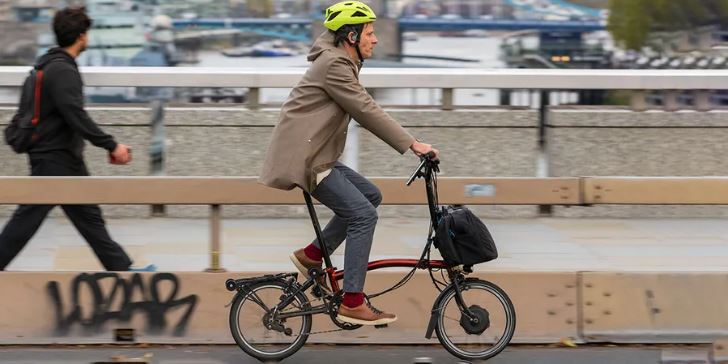I think you’re searching that Are Folding Bikes Slower?
Well!
You’re on right place because we already have worked for you. In the world of cycling, speed is often a paramount concern for riders.
Whether you’re commuting to work, enjoying a leisurely ride through the park, or participating in competitive racing, the question of whether folding bikes are slower than their traditional counterparts frequently arises.
Folding bikes have gained popularity in recent years due to their compactness and portability, but does their convenient design come at the cost of speed?
In this comprehensive article, we’ll explore the dynamics of folding bikes and debunk the myths surrounding their speed.
By the end, you’ll have a clearer understanding of whether folding bikes are indeed slower and whether they’re the right choice for your cycling needs.
Understanding Folding Bikes
Before we delve into the speed aspect, let’s start by understanding what folding bikes are and why they’ve become so popular.
What are Folding Bikes?
Folding bikes, as the name suggests, are bicycles designed with a unique folding mechanism that allows them to be compacted into a smaller and more portable form.
This design feature makes them ideal for commuters, city dwellers with limited storage space, and individuals who need to combine cycling with other modes of transportation, such as buses or trains.
Key features of folding bikes include:
- Foldability: The primary distinguishing feature of folding bikes is their ability to fold down to a fraction of their full size. This makes them easy to carry, store, and transport.
- Small Wheels: Folding bikes typically have smaller wheels compared to standard bicycles. The wheel size can vary, but 16-inch and 20-inch wheels are common.
- Lightweight: These bikes are often designed to be lightweight, making them more manageable when folded and carried.
- Adjustability: Many folding bikes come with adjustable components, such as the seat height and handlebar position, to accommodate riders of different sizes.
Now that we understand the basic characteristics of folding bikes, let’s address the main question: Are folding bikes slower than traditional bicycles?
The Speed Debate: Folding vs. Traditional Bikes
Myth 1: Folding Bikes are Inherently Slower
One of the most common misconceptions about folding bikes is that they are slower by default. This notion arises from the belief that the smaller wheels and compact design must come at the expense of speed. However, this belief is not entirely accurate.
The Truth: Folding bikes can achieve impressive speeds and are not inherently slower. While it’s true that the smaller wheel size can affect the top speed potential, it’s essential to consider several factors that influence a bike’s speed, including the rider’s skill, the terrain, and the bike’s components.
Factors Affecting Bike Speed
To better understand the speed capabilities of folding bikes, let’s explore the key factors that influence a bicycle’s speed:
- Wheel Size: Smaller wheels may reduce a bike’s top speed due to a decreased circumference. However, this effect is more noticeable at higher speeds and on long, straight roads. In urban environments and shorter commutes, the impact is less significant.
- Gear Ratios: Folding bikes come equipped with a range of gear ratios, similar to traditional bikes. Riders can adjust gears to suit their riding conditions, allowing for efficient pedaling and speed maintenance.
- Rider’s Skill and Fitness: Ultimately, a rider’s skill and physical condition play a significant role in determining a bike’s speed. An experienced cyclist on a folding bike can outpace a novice on a high-end road bike.
- Terrain: The terrain you ride on has a substantial impact on your speed. Folding bikes are versatile and can handle a variety of terrains, but they may excel in certain conditions, such as urban environments or moderate hills.
- Bike Components: The quality of components, such as the drivetrain, tires, and frame, significantly affects a bike’s performance. High-quality folding bikes with well-designed components can achieve competitive speeds.
Real-World Speed Performance
To put the speed debate to rest, it’s essential to consider real-world scenarios. Folding bikes are designed for specific purposes, and their speed capabilities align with those purposes:
- Commuting: Folding bikes are exceptionally well-suited for urban commuting. Their agility, ease of folding, and ability to navigate congested city streets make them a practical choice. While they may not reach the top speeds of road bikes, they offer a comfortable and efficient commuting experience.
- Touring: Folding bikes are used by many touring cyclists who prioritize portability. They may not be the fastest option on long, straight highways, but they shine when it comes to exploring diverse landscapes and transitioning between cycling and other forms of transportation.
- Racing: While folding bikes aren’t typically used in competitive road racing, they have their own niche within racing events. Folding bike races, such as the Brompton World Championship, showcase the speed and agility of these bikes in a racing context.
Speed Test: Folding vs. Traditional Bike
Let’s illustrate the speed capabilities of folding bikes with a real-world example:
Scenario: Two experienced cyclists, one on a high-quality folding bike and the other on a standard road bike, embark on a 20-mile urban commute with mixed terrain, including hills and city streets.
Result: In this scenario, the folding bike rider may not match the road bike rider’s top speed on long straightaways.
Still, the folding bike’s agility and ease of handling enable them to navigate through traffic, conquer hills, and complete the commute efficiently.
The overall time difference between the two riders may be relatively small, emphasizing that folding bikes can be competitive in real-world scenarios.
Advantages of Folding Bikes
Now that we’ve established that folding bikes are not inherently slower, let’s explore some of the advantages that make them an appealing choice for many riders:
1. Portability
Folding bikes excel in terms of portability. Their ability to fold down to a compact size allows you to take them on public transportation, store them in small apartments, or easily transport them in a car. This convenience can save you time and effort in various situations.
2. Multi-Modal Commuting
For commuters who rely on a combination of cycling and public transit, folding bikes are a game-changer. You can fold your bike and take it on a bus or train, eliminating the need for a car or a traditional bike rack.
3. Versatility
Folding bikes are versatile machines that can handle a range of riding conditions. Whether you’re navigating city streets, tackling moderate off-road terrain, or going on a leisurely ride through the park, folding bikes are up for the challenge.
4. Security
Due to their compact size, folding bikes are easier to store securely. You can bring them indoors, preventing theft and exposure to the elements, which can extend their lifespan.
Conclusion – Are Folding Bikes Slower?
In the debate over whether folding bikes are slower than traditional bicycles, it’s clear that folding bikes are not inherently slower.
While they may not reach the top speeds of high-end road bikes on long straight roads, their advantages in portability, versatility, and convenience make them a practical choice for many cyclists, particularly commuters and urban riders.
Ultimately, the choice between a folding bike and a traditional bike should depend on your specific needs and riding conditions. If you prioritize portability, multi-modal commuting, and a versatile riding experience, a folding bike may be the ideal


